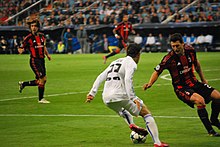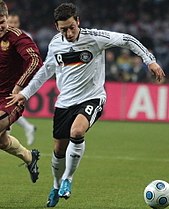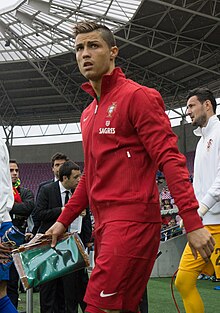Mesut Özil (
German pronunciation: [ˈmeːzut ˈøːzil],
Turkish: [me̞ˈsut ˈø̞zil]; born 15 October 1988) is a German
footballer who plays for
Premier League club
Arsenal and the
German national team.
Özil has been a youth national team member since 2006, and a member of
the German national team since 2009. He gained international attention
during the
2010 FIFA World Cup and was nominated for the
Golden Ball Award, which is awarded to the tournament's best player. Özil started his senior career at hometown club
Schalke in the
Bundesliga in 2006, transferred to
Werder Bremen
in 2008 and transferred to Real Madrid in August 2010 following his
breakout performance at the FIFA World Cup with Germany. On transfer
deadline day of summer 2013, he moved to Arsenal in a club record of
£42.5 million.
[4][5][6][7]
Özil is acclaimed for his finesse and improvisation as an attacking
midfielder. His style and ability for providing assists for his
team-mates has been compared by former manager
José Mourinho to that of Real Madrid legend
Zinedine Zidane.
[8]
In 2011, Özil ranked first in assists in major European and domestic
competitions with 25. In 2012, he ranked first in assists in La Liga
with 17.
[9][10] He was also one of the top assist providers in the 2010 FIFA World Cup and
UEFA Euro 2012 with three in both.
Club career
Gelsenkirchen and Rot-Weiss Essen
Özil began his youth career playing for various clubs in
Gelsenkirchen and then played five years for
Rot-Weiss Essen.
Schalke 04
In 2005, Özil moved to the youth department of
FC Schalke 04.
He was a midfielder and wore 17 as his squad number, after starting as a
playmaker and central attacking midfielder in the place of the
suspended
Lincoln in
Ligapokal matches against
Bayer Leverkusen and
Bayern Munich.
[11]
On making the first team there, he was described as "the next big
thing," but he eventually fell out with club management and moved on to
Werder Bremen in January 2008.
[12]
Werder Bremen
On 31 January 2008, Özil moved to
Werder Bremen for a reported fee of €4.3 million, signing a contract with the German club until 30 June 2011.
[13] Fresh off his fallout at Schalke 04, he stepped into the shoes of Brazilian playmaker
Diego to help lead the north German club to the
2009 DFB-Pokal with the winning goal in a 1–0 victory over
Bayer Leverkusen in Berlin.
[14] He also excelled in Europe where he led Werder Bremen to the final of the last ever
UEFA Cup, losing out to
Shakhtar Donetsk of Ukraine.
[15]
Although Bremen failed to get going in their 2008–09 Bundesliga season,
eventually finishing a disappointing 10th, Özil managed to make a
significant impact in most games and came away with a respectable three
goals and 15 assists that highlighted his attacking credentials.
[15] In his
second season, Bremen finished a respectable third, with Özil contributing 9 goals and 17 assists in 31 league fixture appearances.
Real Madrid
2010–11 season
Due to his performances in the
2010 FIFA World Cup, Özil ensured his place among Europe's top young talents. He was sought by teams like
Barcelona,
Arsenal, and
Manchester United
and reports even claimed that a deal was struck for a transfer to
Barça. Werder Bremen denied the report and on 17 August 2010, the team
announced that they had reached an agreement with
Real Madrid.
[16] The transfer fee is believed to have been in the region of €15 million.
[17]
Upon signing, Özil said, "When the offer came in to join Real Madrid,
there is no decision to make. Let's be honest – you don't refuse this
club. I was in no rush to leave Werder Bremen, but this is one club you
say yes to. They are an institution, a club with a fantastic history,
stadium and squad full of world-class players. The prospect of
performing at the Bernabeu is so awesome you jump straight in."
[18] Özil made his debut on 22 August in a friendly match against
Hércules, which Real Madrid won 3–1.
[19]
His jersey numbers were changed often before the season started. He was
given the number 26 in the pre-season and 19 for his debut. But
following the transfer of
Rafael van der Vaart to
Tottenham Hotspur, he was given the vacant 23.
Özil was brought in to back up teammate
Kaká, but due to his surgery, Özil obtained a starting role. He then made his La Liga debut for Real Madrid as a substitute for
Ángel di María in the 62nd minute against
Mallorca, which Real Madrid drew 0–0.
[20]
He made his season debut in the
Champions League on 15 September. He got his first assist with Real Madrid in the 74th minute against
Ajax after he crossed for a
Gonzalo Higuaín goal.
[21]
He walked off the pitch as a second half substitute to standing ovations in his first two games as a starter at the
Santiago Bernabéu. His first goal came in a league match against
Deportivo La Coruña on 3 October 2010, in a 6–1 victory.
[22] Özil's first Champions League goal with Real came in the 14th minute against
Milan on 19 October 2010.
[23] On 22 December, he made his debut in the
Copa del Rey, scoring once in a 8–0 victory over
Levante.
[24]
He finished
the season
with 25 assists, the highest for any player in any major European
competition that season. Özil's performances for Real Madrid during his
first season were praised by media, fans and players.
[25][26]
2011–12 season
Özil began wearing the number 10 shirt for Real Madrid in
2011–12, signalling manager
José Mourinho's intent to use the German international as his main playmaker.
[27] On 14 August 2011, Özil scored his first goal against
Barcelona in
El Clásico in the first leg of the
2011 Supercopa de España.
[28] On 17 August 2011, Özil was
sent off in the last minute of the second leg of the 2011 Supercopa after an altercation with Barça forward
David Villa.
[29] Özil expressed his desire to end his football days at the club in an interview with German magazine
kicker,
saying, "I'd like to end my career at Real Madrid. I know it will be
difficult because I have many more years ahead of me and many younger
and good players will also be out there, but I want to be part of that
future. I know what I'm capable of and I'm convinced I'll stay at Real
Madrid many years."
[30]
Özil was on the short-list of 2011–12-year's
FIFA Ballon d'Or award.
[31]

Özil's boots on display at the Santiago Bernabeu museum
He finished atop the
La Liga assists chart,with 17 assists.
[32] On 2 May 2012, he helped Real Madrid to clinch its 32nd
La Liga
title as he assisted Real Madrid's first goal and scored the second
goal against Bilbao, which Real Madrid later won by 3–0. Eleven days
later, Özil scored two goals in the final game of the regular season
against
RCD Mallorca,
once again consolidating his excellent performance with the club. The
win made Real the first club in the Spanish top flight to ever reach 100
points in a season.
[33] His fine form with Real Madrid and German national team saw him earn nomination for
UEFA Best Player in Europe Award, in which he finished 10th, being youngest in Top 10.
[34]
2012–13 season
With arrival of
Luka Modrić
before the start of the season, some in the media claimed Özil was
unhappy at Real Madrid, but he later rejected such talk and claimed he
was happy at the club and looking forward to compete for his place.
[35] After the start of the season, he added the
Spanish Super Cup title to his honours. In league play, he provided an important assist to
Cristiano Ronaldo who equalized in a 2–2 draw against Barcelona at Camp Nou.
[36] On 6 November, Özil scored a crucial 89th-minute free-kick to rescue a draw for Real Madrid and secure a point against
Borussia Dortmund.
[37] He continued his fine form in the league as he scored another brace against Real Valladolid to rescue Real Madrid in a 3–2 win.
[38]
He then went on to finish the season with 29 assists, although Real
Madrid did not win any silverware except for the Spanish Super Cup,
Özil's performance was praised. At the end of the season Ozil had more
assists then any other player in the league, with 26 assists.
Arsenal
2013–14 season

Özil taking a free-kick for
Arsenal.
On 2 September 2013, Özil agreed to join English side
Arsenal.
[4] Both fee and contract duration were undisclosed, but they are believed to be around £42.5 million for a five-year deal.
[5] The transfer makes him the
most expensive German football player of all time.
[6] Özil was assigned the number 11 shirt by the team.
[7]
Özil said of transfer: “At the weekend, I was certain I would stay at
Real Madrid but afterwards I realised I did not have the faith from the
coach or the bosses. I am a player who needs this faith and that is
what I have felt from Arsenal, which is why I have joined."
[39] Several Real Madrid players were dissatisfied with Özil leaving the club, namely
Cristiano Ronaldo who said: "He was the player who best knew my moves in front of goal...I'm angry about Özil leaving."
[40]
Özil made his debut for Arsenal in their league game away to
Sunderland on 14 September 2013. He assisted
Olivier Giroud's goal in the 11th minute of the match. They went on to win the match 3–1.
[41][42] Three days after that, he made his Champions League debut for Arsenal against Marseille.
[43] Just over three weeks later since he made his debut for Arsenal, he made his
home debut against
Stoke City
in a 3–1 victory. He was involved in all three goals, with two assists
and a free kick which was saved but it fell into Ramsey's path.
[44] He scored his first goal for Arsenal, a brilliantly controlled finish from an
Aaron Ramsey cross, in a 2–0 win against
Napoli in the Champions League.
[45] He then scored his first two
Premier League during the 4–1 home win against
Norwich City on 19 October, 18 days after he scored his first goal for Arsenal on home turf.
[46]
International career
Career start
In an interview with
FourFourTwo Magazine, Özil spoke about his choice to play for the
German national team:
"I am third generation in Germany: my father grew up here. Turkey will
always be a special country for me but I did not doubt my decision to
play for Germany – ever. I started to play for Germany in the youth
teams."
[47]
In September 2006, Özil was called up for the
Germany under-17 team. Özil was a member of the
German under-21 team from 2007. On 29 June 2009, Özil was selected the man of the match in a 4–0 win over
England during the
U-21 European Championship final.
[12]
He made his debut for the
senior side during a friendly match against
Norway on 11 February 2009. He scored his first goal for the senior team in his third appearance, another friendly, against
South Africa on 5 September in
Leverkusen at the
BayArena.
On an individual level, Özil was rewarded for his outstanding
Bundesliga play by being named the best player of the first leg of the
2009 season.
[48]
2010 FIFA World Cup
Özil was selected for
Germany's squad for the
2010 FIFA World Cup in South Africa, starting in all of the team's matches. Özil provided an assist for
Cacau's goal to the 4–0 final score against
Australia in Germany's first group game. He scored a left-footed half-volley from the edge of the
penalty area against
Ghana in the final group game, ensuring Germany progressed to the second round as
group winners.
[49]
On 27 June 2010, Özil played in Germany's win over
England in the
last 16 match, setting up the fourth goal with a cross to
Thomas Müller as Germany triumphed 4–1.
[50] During the quarter-final match against
Argentina, he assisted the second goal for
Miroslav Klose with a cross to ensure the 4–0 final score for the Germans.
FIFA announced that he was among the ten tournament players nominated for the
Golden Ball.
UEFA Euro 2012
Özil was one of the leading forces in Germany's
qualification for
UEFA Euro 2012, scoring five times during the campaign as Germany won 10 out of 10 games to top their
group.
[51]
Özil also confirmed his reputation as a decisive passer, as he provided
seven assists, more than any European international during Euro 2012
qualification.
[52][53] When asked about his country's chances at
Euro 2012, Özil simply replied, "We have the potential to beat anyone and we have what it takes to win the title."
[54]
On 29 February 2012, Özil was recognised as Germany's best
international of the year for 2011 prior to kick-off at a friendly
against
France in
Bremen.
[55][56] Özil's
Germany were drawn with
the Netherlands,
Denmark and
Portugal into
Group B at Euro 2012, widely touted as the "
Group of Death".
[57] His performance at
Euro 2012 earned him two Carlsberg Man of the Match Awards.
[58]
2014 FIFA World Cup
Özil ended the
2014 FIFA World Cup qualification campaign as Germany's
top scorer with nine goals.
[59]








